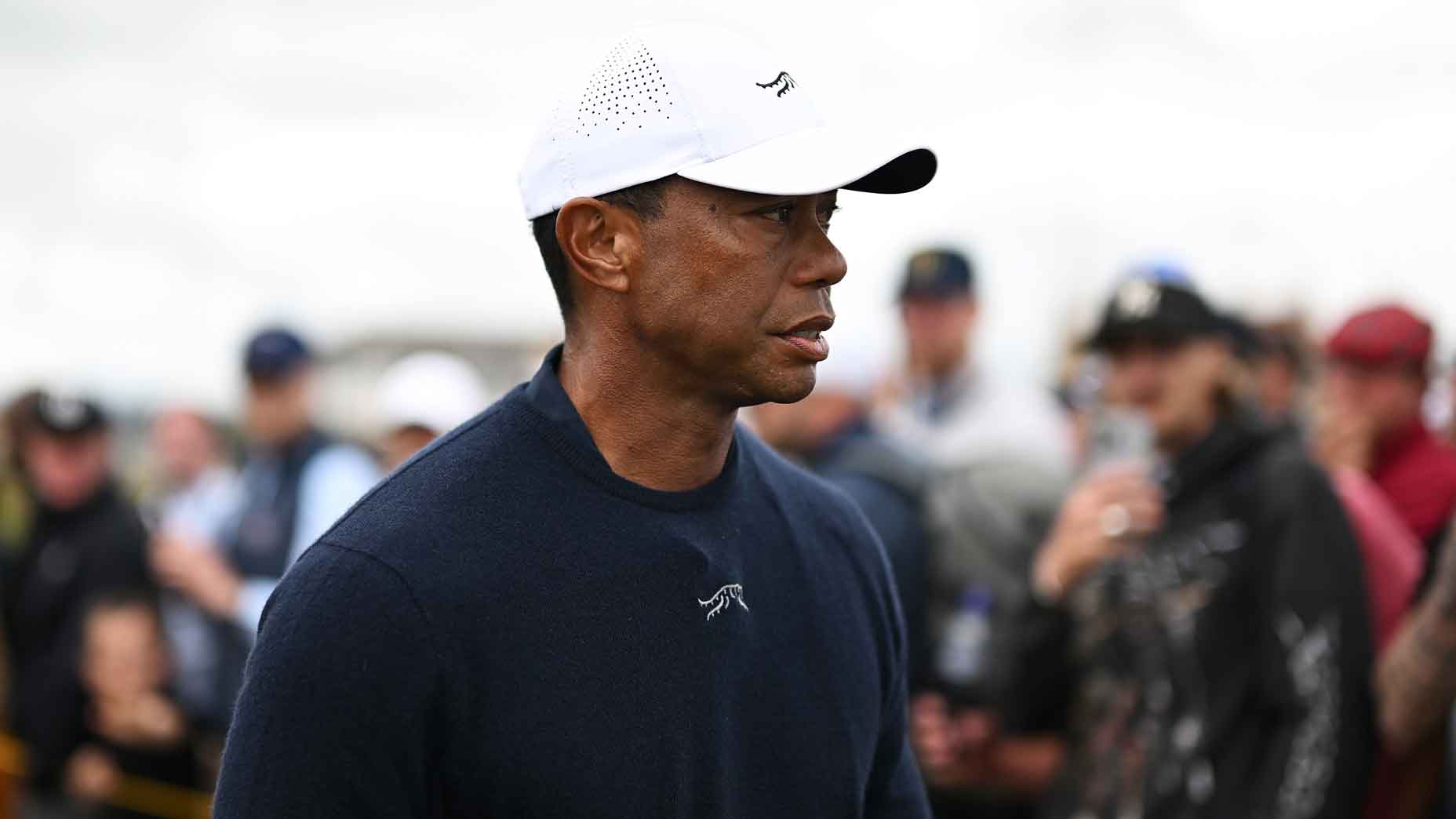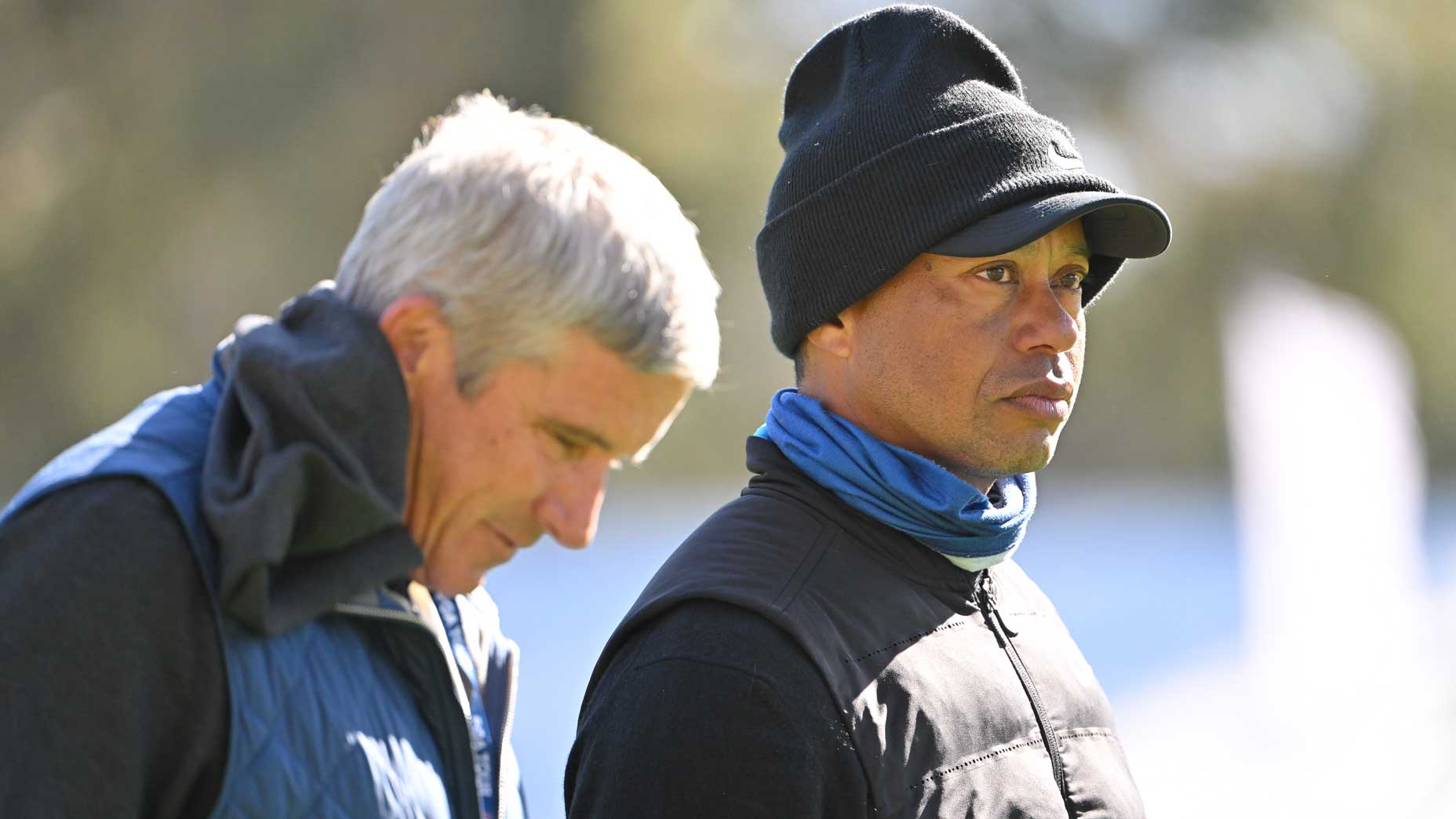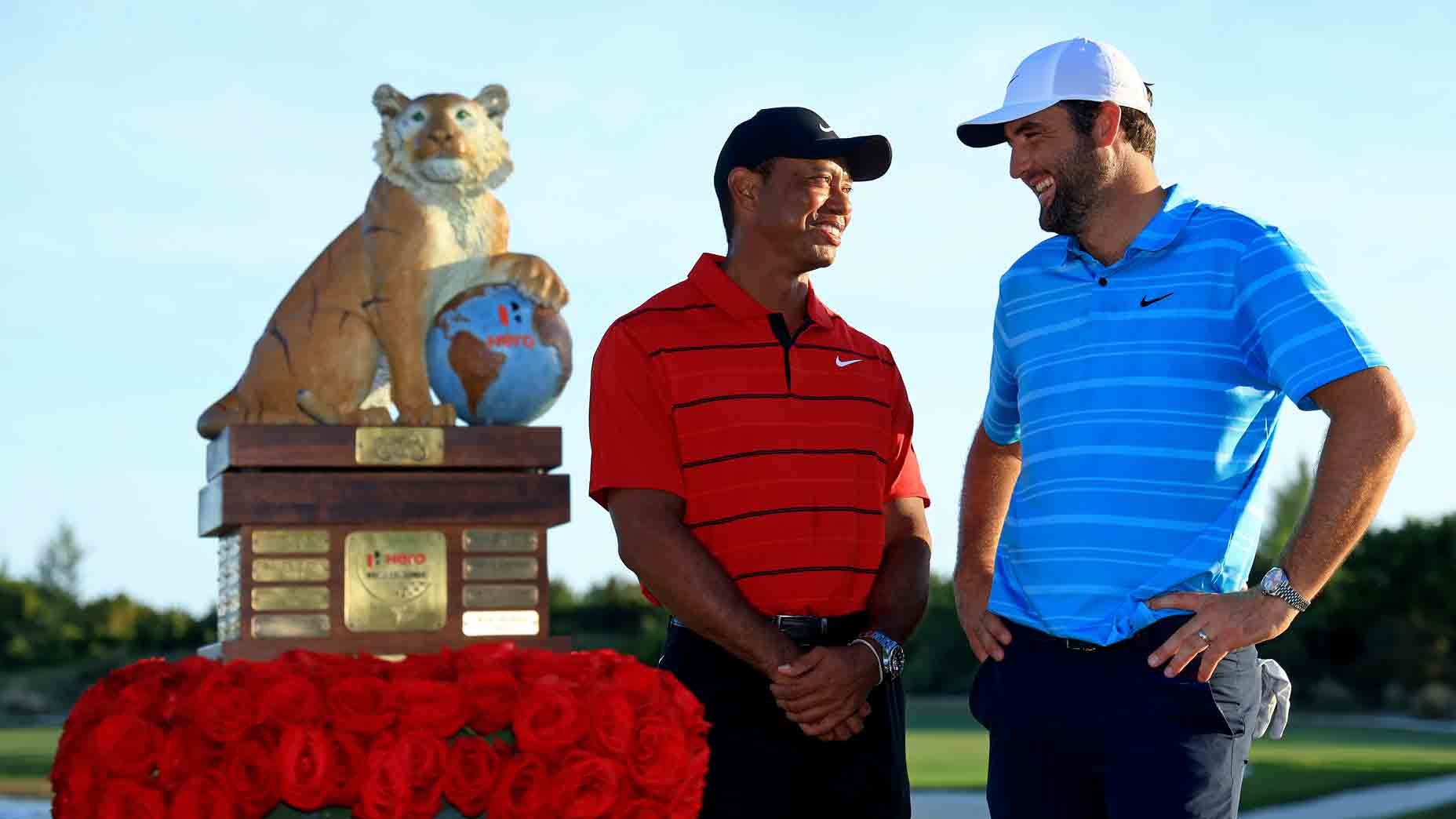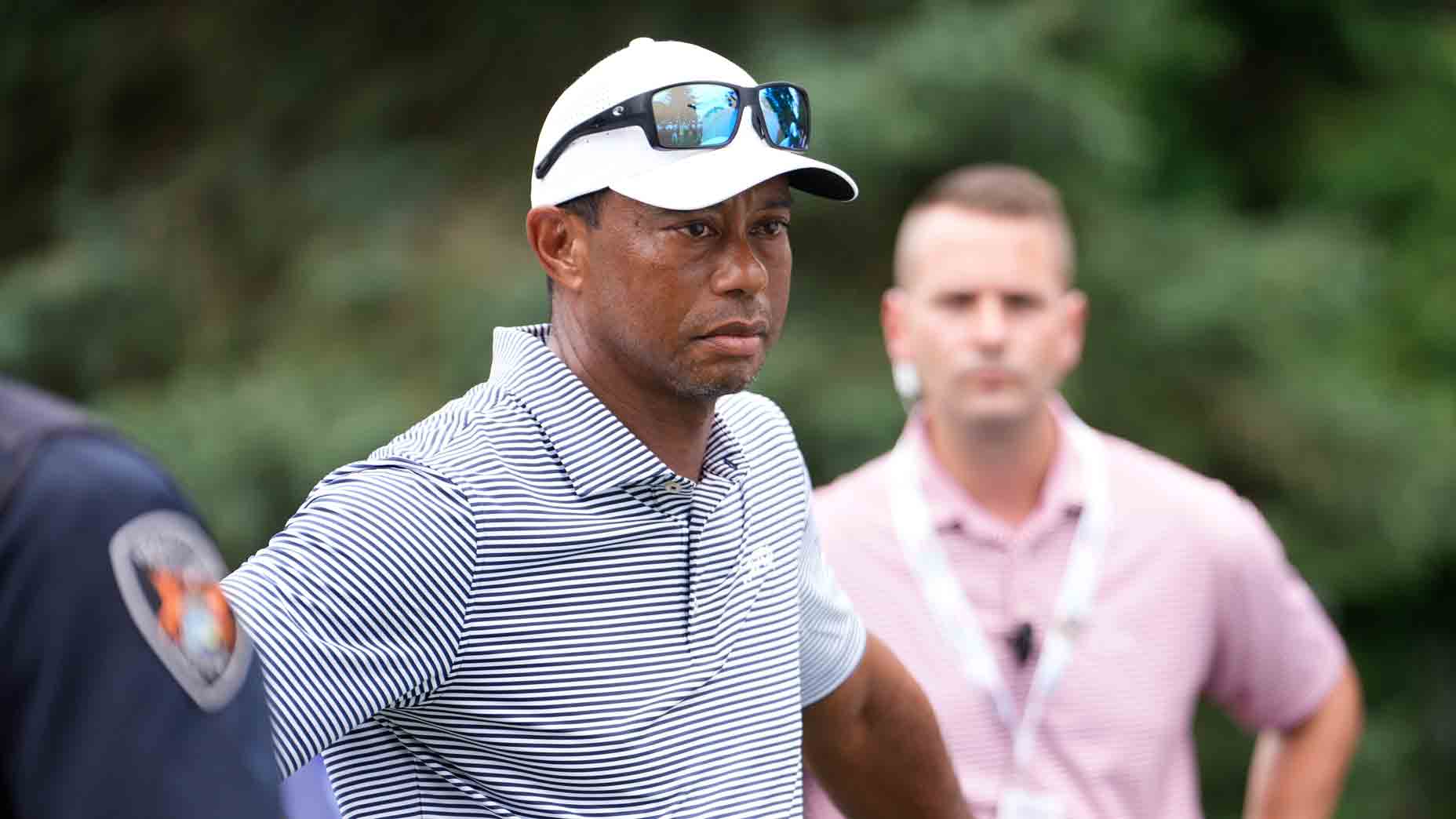You missed the most telling moment of Tiger Woods’ Open Championship

Tiger Woods missed the cut at the Open Championship on Friday afternoon.
Getty Images
TROON, Scotland — Early on the afternoon of April 14, a crowd gathered underneath the great oak tree at Augusta National.
The same crowd has gathered at this spot and at this time for the better part of the last century. Club members, golf movers-and-shakers, legends and tournament rejects, each dressed in pastel and united by a common goal: to see the final pairing off on Sunday at the Masters.
But on this Sunday, something wasn’t right. In the foreground, the first tee at Augusta National sat empty, the leaders due any second, beckoning for the nervous hum of energy that joins these final few seconds each April. Something in the background, though, had brought the decibel level down to zero.
It was Tiger Woods, striding gingerly up the 18th fairway and onto the putting green in dead-last place, cruising toward a 72-hole score of 16 over with a final-round 77. The ovation from the crowd surrounding the 18th was furious, but the silence from the crowd underneath the oak tree just a hundred yards away was equally deafening. Finally, a longtime Woods acquaintance turned in my direction and broke the quiet.
“I don’t know how much longer he can do this,” he said.
Really? I asked.
“I mean, only he knows the answer,” the acquaintance said. “But this?”
He nodded toward the leaderboard.
“It’s not in his nature.”
THREE MONTHS LATER, a Scottish brogue sliced through the wind like a patented Woods stinger.
“THANKS FOR COMIN’ BACK, TIGER!”
The man’s voice ricocheted around the 18th grandstand at Royal Troon, and soon a similar sentiment was being shared by each of the few thousand watching the end of Woods’ round. One by one they rose to their feet, saluting Woods with a sense of sincerity and gratitude saved only for rare moments at golf’s major championships. You’d never know it from listening, but another Tiger Woods major championship season was about to end with a whimper.
Woods shot 77 on Friday afternoon at the Open Championship to push his 36-hole score to 14 over, missing the cut for the third time in four major starts in 2024. For the sixth time in eight tries since his car accident in the winter of 2021, Woods failed to post a 72-hole score at a major.
It is not a bold claim to say that Tiger’s game is nowhere near primetime-ready right now. His swing is beautiful and violent but its outcomes are too inconsistent; his putter is the same but his stroke is too streaky; his body is chiseled but his movements are too disjointed. As a result, he has not shot a tournament round in the 60s since February 2023, and in the blisteringly competitive modern world of men’s professional golf, that’s a recipe to find yourself regularly watching from home.
These are facts, and if you are among those who believe that things in Tiger Woods’ life exist only in the binary world of golf scores, then these facts inform your opinion.
But you’re not foolish enough to believe that Tiger Woods’ professional career has only ever been dictated by birdies and bogeys, are you? You don’t seriously think that words like legacy and history are only spoken in the context of hunks of metal and winner’s checks. Otherwise, you wouldn’t have been watching on Friday afternoon, when Woods appeared up the 18th fairway at Royal Troon for the final time in 2024, and perhaps the final time ever.
You were watching then. And you were watching on the holes before that, as Woods’ game looked too loose and the bogeys added up like shin-kicks in the biting cold. And let’s be honest, you’ve been watching for the better part of the last five years with Friday’s same sense of fleeting hope. You’ve watched anyway, in part to honor the greatest player you’ve ever seen, and in part because watching him engenders the same sense of wonder it did when you started watching 27 years ago. Even though the slow creep of time is noticeable and the scores are a dozen shots higher than their worst back in the early days, when you see Tiger today you remember how it felt to watch him hold the entire world in his hands, and you try — as best as anyone can, really — to feel gratitude for what you’ve seen without feeling pity for what exists now.
We’ve been down this road together, Tiger and us, boats against the current through a world that is punishing and cruel and beautiful and redemptive and, above all, moving — oscillating endlessly from one thing to the next. It’s a terrifying ride much of the time, but every so often a moment arrives that reminds us it is worth it. Over these last 27 years, Tiger has been a piece of so many of these memories, which is why we find ourselves craning our necks to steal a glimpse even when we know we won’t like what we see.
You’re not wrong for feeling this way. You can rest assured Tiger feels it, too. It’s why he puts himself through sheer misery to prepare physically for golf tournaments, and why he puts himself through something even worse once he tees off and the scores start moving the wrong way. Yes, he believes he can still win, but he’s not expecting it.
“Obviously, [the majors] test you — mentally, physically, emotionally — and I just wasn’t as sharp as I needed to be,” he said Friday. “I was hoping that I would find it somehow, but I just never did.”
Of course he didn’t find “it.” It’s hard to find anything when you only play four times a year. But when you’re Tiger Woods, you allow yourself to believe in the impossible. That is, until reality arrives at the door.

“THIS MIGHT BE THE END OF AN ERA FOR HIM,” the man said — his Scottish brogue vocalizing what we were all thinking — as Woods appeared in the 18th fairway at Royal Troon.
The truth is that it really might. After three missed cuts in four tries in 2024, and no serious competitive finishes since his near-fatal car accident in 2021, the whispers about Tiger’s retirement will only grow louder.
Woods sniped at Colin Montgomerie earlier this week for his suggestion that Woods hang ’em up, but Tiger himself has often opined that life as a “ceremonial” golfer — that is, a golfer accepting exemptions and tee times without hope of competing — would be tantamount to torture. After a legacy built upon winning, is he comfortable living a prolonged golfing life without it?
Perhaps, as Tiger suggested on Friday, his hopes lie in getting healthier. His body is improving slowly but noticeably, perhaps enough to play a larger schedule in ’25. He said Friday that he intends to play in the 153rd Open at Royal Portrush in 2025, but equally telling was the fact he needed to be reminded of the location. Those words make it sound as if getting a 48-year-old man with a half-dozen serious back surgeries and a nearly severed load leg ready for major championship golf is a matter of properly timing his ibuprofen intake. Newsflash: It’s not.
Maybe this is what Tiger needs to tell himself to feel like he can still win majors. Maybe this is what he needs to keep competing when the scores keep rising and the MCs stack up. After all that we’ve witnessed, who are we to tell him not to?
More importantly, who are we to say he’s wrong?
On Friday afternoon at Royal Troon, at least, there were no volunteers among the 50,000 or so in attendance, many of whom followed up close.
They watched five and 10-deep down the fairway for most of the day, willing Woods’ every shot with all the goodwill they could muster — all seventy-seven of them. And then, as the round was nearing its natural conclusion on the 18th hole, they stuffed themselves into every nook and cranny of the short par-4, filling almost every seat in the cavernous grandstand and pressing against every barricade along the fairway to deliver the 15-time major champion the standing ovation they felt he deserved.
Even the Royal Troon clubhouse, ancient and proper, joined in the madness. Members pressed against every window inside the 150-year-old club as Woods finally trudged up to the putting surface wearing a look of bitter frustration and a soft smile. Even the eldest and most formal of the bunch could be spotted stealing photos with cell phones in hand. The noise was deafening now, even inside the clubhouse, where the membership stood and clapped. Tiger could not hear them from behind the glass, but it did not seem to matter.
They stood there — children and adults, men and women, foreign and native — and cheered for a few long seconds, not minding the score next to Woods’ name or the look of bitter frustration in his eyes. And then, for a moment long enough to notice, Tiger looked back and smiled.
It was not in their nature, and certainly not in his.
You can reach the author at james.colgan@golf.com.










